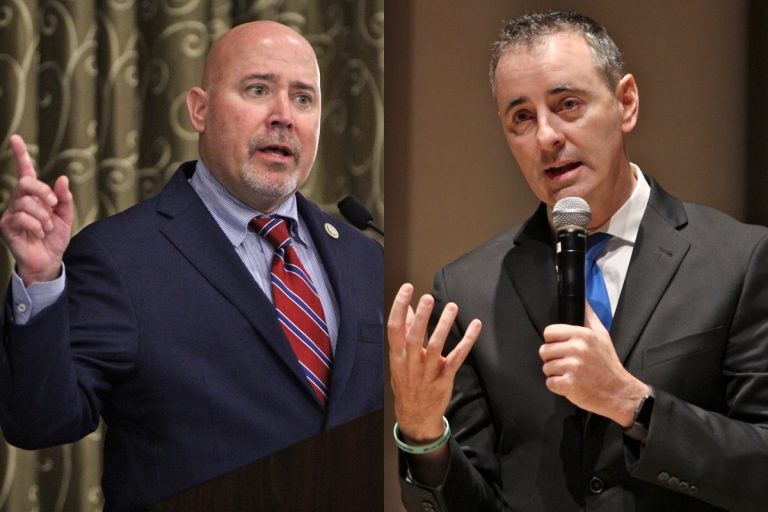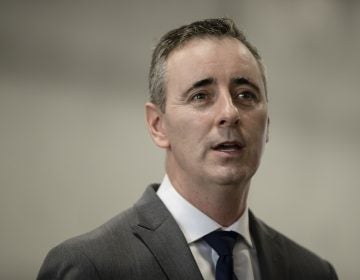Some Pa., N.J. members of Congress spending $200K or more on ‘franking’
How much or how little members of Congress spend on mailing constituents information or connecting with them electronically varies from $14,000 to more than $300,000.
Listen 5:07
Tom MacArthur (left) an incumbent running for Congress in New Jersey's 3rd District, and Brian Fitzpatrick, an incumbent running for Congress in Pennsylvania's 1st District. (Emma Lee/WHYY)
Lawmakers do more than just cast votes. The nation’s 435 members of the U.S. House basically run their own companies. They’re each given roughly $1.4 million annually to use as they see fit on staff, travel, equipment upgrades, and for communicating with their constituents.
During this session of Congress, two embattled Republicans from the Philadelphia region spent more than six figures’ worth of taxpayer dollars on those mass communications, commonly referred to as “franked mail.”
At $316,000, Bucks County Republican U.S. Rep. Brian Fitzpatrick spent the most of any lawmaker in the region. Fitzpatrick is fighting to keep his seat in one of the most competitive, closely watched congressional races in the country.
“Of course, you have to communicate with your constituents,” he said. “What’s the alternative?”
South Jersey Republican U.S. Rep. Tom MacArthur came in second behind Fitzpatrick, spending close to $210,000.
“It’s not a waste of taxpayer dollars,” said MacArthur, who considers constituent outreach to be a priority. He is fending off a challenge from Democrat Andy Kim in another competitive midterm race.
The more than a quarter of a million dollars Fitzpatrick spent included some color mailers that look like a local newspaper, as well as some critics say look like campaign material. He also sent out electronic surveys and requests to like his official Facebook page. Fitzpatrick defends those expenditures and says he was also able to use the privilege to reach broad swaths of his constituents at once.
“We did a telephone town hall … You’re reaching 100,000 people on that call,” he said.
The franking privilege dates back to 1775 and it enables lawmakers to use their signature instead paying for a stamp to communicate with the people they represent.
Taxpayer-funded mail made more sense in the 1700s than it does now, said Melanie Sloan with American Oversight, a government accountability group.
“The goals behind it are good. It has long been subject to abuse in that it gives members of Congress a leg up in their campaigns against opponents because it’s taxpayer-funded mailers going to every home in the district,” Sloan said.
But nowadays, with lawmakers using the privilege to pay for things like online polls and even to buy Facebook likes, Sloan thinks it smells fishy.
“It’s a little disingenuous because then constituents are … They should be forming their own opinion about whether they like it or not and this is just attempting to sway people to believe that something’s more popular and more important than … it may otherwise actually be,” Sloan said.
“Look, every member of Congress gets the same budget, the exact same budget. Some members spend them on swanky offices. Some members buy cars or SUVs,” MacArthur said. “I have low-budget offices. I’m in the basement of a town hall where I don’t have to pay rent. I’m in a community center where I pay very little.”
Lawmakers can’t use the privilege within 90 days of an election and a bipartisan commission has to sign off on anything that gets sent out using taxpayer dollars, which MacArthur says makes it legitimate.
“I choose to communicate with my constituents. I send a lot of letters, I send flyers sometimes,” he said. “You know, every flyer has to get approved by ethics, which is exactly 50 percent Republican and exactly 50 percent Democrat. It has to get approved by both sides.”
In the scheme of a $4 trillion federal budget, $200,000 or $300,000 isn’t much, but over in Central New Jersey, Republican U.S. Rep. Leonard Lance spent just over $20,000. He’s proud of not using all of his allotted budget.
“We have given back about a $100,000 a year in each of the years I’ve been here. I think I’m actually one of the very few members of Congress who actually gives back some of the amount that is accorded to our office,” Lance said.
For Lance, being thrifty with his office budget is a badge of honor.
“I try to practice what I preach and I am a fiscal conservative and I try to lead by example,” Lance said.
And in Philadelphia, Democrat Rep. Brendan Boyle spent just under $40,000, while Rep. Dwight Evans dropped around $14,000. Evans doesn’t knock his colleagues in sprawling districts for spending more than he does, because he knows his district is more compact.
“The concentration is all of the city of Philadelphia now, so it would take you maybe a half an hour to go from one part to the other,” Evans said.
Watchdog groups say that’s a part of the problem too: that lawmakers in both parties continue the system of unlimited taxpayer funded mailers even if they know overhauling the practice could save taxpayers millions of dollars each year.
—
Dylan Croll contributed reporting to this story.
WHYY is your source for fact-based, in-depth journalism and information. As a nonprofit organization, we rely on financial support from readers like you. Please give today.



